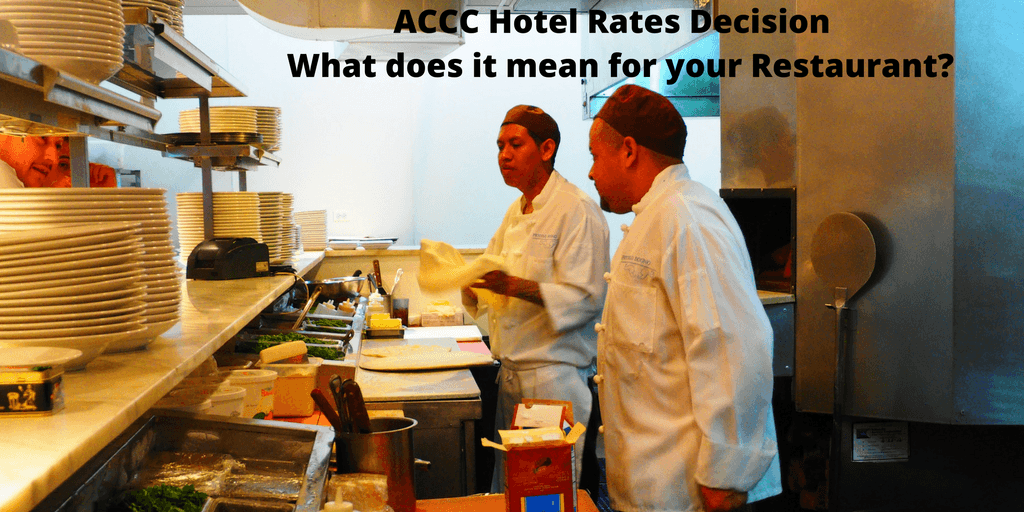The AFR Weekend is reporting a decision from the Australian Competition and Consumer Commission regarding the price which Hotels have been able to charge their customers. Until now, they have been precluded from offering cheaper prices than the prices that they offer to sites like Booking.com and Expedia. These two companies control over 80% of the online travel booking market. They have finally agreed to allow hotels to offer lower rates through telephone bookings, walk-ins and loyalty programs, instead of requiring them to only offer a contracted “lowest price guarantee” through their platforms. These Online Travel Agents (OTAs) have up until now been able to force Hotels to online offer one lowest price, which the OTA has been able to offer knowing that the Hotel is unable to offer a lower price. This means that Hotels keen to fill near dated empty rooms have not been able to.
The OTA duopoly consists of Expedia/Wotif/Orbitz and Booking.com / Priceline. The concentration of market power has enabled them to evolve from being a seller of distressed inventory for Hotels to being able to aggressively compete for Hotel customers in their own right, interposing themselves between the Hotels and their customers and taking a significant commission whilst creating only a small amount of value by aggregating available Hotel rooms.
The new deal will enable Hotels to offer cheaper rates over the phone, to walk ins and through their loyalty programs. The Accommodation industry has slammed the ACCC’s deal, saying they have ‘significant concerns’ that operators are prevented from advertising cheaper rates on their own website.
In a scenario that would be familiar to many Restaurants in Australia, the Accommodation Association of Australia’s Richard Munro has stated that regional operators risk being forced out of business by high commissions. Another concern is the difficulty placed on Australian business owners by large offshore Corporations. According to the Hotel Management article, the new terms and conditions of one OTAs contract state that they are governed by the laws of the Netherlands. This is similar to the Restaurant situation with the largest player, Menulog, being wholly owned by Just Eat out of the United Kingdom. The Tourism Accommodation Australia CEO, Carol Giuseppi, also criticised the decision stating that not allowing Hotels to offer cheaper rates online decreases competition and is detrimental to travellers and the hotels.
The decision, in our opinion, will allow the OTAs to slightly rephrase their marketing, to “gauranteed lowest online price’. To many consumers, we believe that they will think that the online price is the lowest price, so they will be little drive to enquire directly with the hotel for a cheaper price. The cost of taking a phone booking is significantly higher than an online booking, so it works against the flow that the Hotels would naturally want to encourage their customers to take.
What does the ACCC decision mean for Restaurants?
This does not bode well for Restaurants if a similar decision was to be made by the ACCC in regard to Menulog. We are continually hearing from Restaurants about the power that Menulog has over them for the provision of online orders. Whilst the CBD is seeing increasing competition from UberEATS, and to a lesser extent Deliveroo and in last Foodora and Delivery Hero, a little way from the capital cities and Menulog is the dominant player by far. It is able to raise prices with impunity, given by the recent commission increase to 14% ex GST. It is also able to send out emails ‘offering’ restaurants the opportunity to participate in 35% off campaigns. These campaigns, based on a specific area, are used by Menulog to drive increased orders, and Restaurants not participating can see a massive decrease in orders. Lastly the commission auction system is also creating unpredictability in order volume for Restaurants.
How can Restaurants best deal with the Online Ordering Monopoly?
As Menulog continues to increase profits to justify the hefty price tag that was paid for it by Just Eat, Restaurants will continue to struggle for profitability. We wrote our 6 step guide to dealing with Menulog recently, but it is not easy.
Last night we ordered over the phone some Indian food from a local Restaurant. Their phone number isn’t listed on Menulog, because Menulog want to force customers to order online, but we wanted to order direct from them to save them paying the commission. Menulog isn’t finding them a new customer, we are a loyal repeat customer and don’t think it is worthwhile to pay 14% + GST just to take an order online from an existing customer. On Menulog they are offering 10% off for the first order and 10% of on orders over $100, none of which are available when ordering over the phone and ordering over the phone is more difficult, including the difficulty with payment and the time taken, both for the customer and for the Restaurant.
Our Take Away Online Ordering system is empowering Restaurants to use the power of the internet and to build their own database. This is the power that Menulog is wielding, they have millions of email address and are building up a database of habits, preferences and likelihoods of consumers online ordering patterns. The more orders that go into the system, the more powerful it is and every time one of your customers orders goes through that system, Menulog is closer to the customer and you are further away.
If you are experiencing financial distress because of high Menulog commissions, please contact the team at Marketing4Restaurants and we will try to help you to build some profitability into your Restaurant business.
Is Poor SEO Killing Your Restaurant?
Too many times we see customers with websites that are costing restaurants thousands of dollars every month through poor design, poor messaging and poor SEO. If your website could be improved to bring in 200 extra visits per month and just 10% of those made a booking, and each booking was for 2.5 seats on average at $50 a seat, you would have an extra $2,500 in revenue a month. A 30% food cost, that is $1,750 in profit extra a month. This ignores those customers coming back as regulars – which is more profit.
Remember, if these customers aren’t finding your Restaurant, they are finding your competitors.
Get one of our obligation free 7 point website SEO audits to see what you can get your web developer to fix to increase your revenue today.


